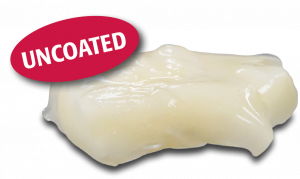
Here’s a short quiz: How do you protect yourself against the rain? A raincoat. What do you wear in a snowstorm? A winter coat. What do you put on your dog on a freezing cold day? A doggie coat. Living things need coats to protect them against the harsh elements that can damage them or make them ill.
Probiotics are living organisms that we can take in supplement form to help us with digestion, immune function, and other health benefits. In order for them to provide these benefits, they need to reach their destination safely; that is, alive and viable. If we send them off into harsh elements without protection, without a proper “coat”, they don’t fare well and can’t deliver the positive benefits for which we took them in the first place.
Read about understanding probiotics: a profile of good bacteria
What is enteric coating?
Enteric coating is a substance that is applied to capsules or tablets to protect them from disintegration or breaking down by stomach acids before they reach the small intestine where they are absorbed. Supplements in capsule form are coated either because they can irritate the stomach lining, or because gastric acid would destroy them, preventing them from reaching the small intestine.
In the past, enteric coatings were made from a variety of substances, including plastics, shellac, and waxes. Today, an all-natural enteric coating is available, made from plant-sourced stearic fatty acids and marine sourced sodium alginate. It is designed to withstand gastric acid, then dissolve in a neutral environment, like your intestines. When you swallow a probiotic or other supplements, it takes an average of 60 minutes to pass through the stomach and reach the small intestine. Enteric coating is viable long enough to withstand gastric acid and release its contents once it reaches the intestines.
Here is what happens to an uncoated supplement when it hits stomach acid:

Probiotics and enteric coatings
Probiotic supplements are available in a variety of forms, including capsules, beads, powders, liquids, and tablets. If you want to reap the full benefits of your probiotic supplement, be sure it’s wearing a coat: an enteric coating, that is. This is a proven way to ensure you will get the viable microorganisms you paid for.
Read about probiotics and enteric coatings: What’s the story?
For example, the authors of a 2018 Canadian study compared three different commercial probiotic products: two were not enteric-coated and one was. Upon immersion in simulated gastric fluids, the two noncoated supplements disintegrated within 5 minutes, while the coated product remained intact after 60 minutes. This is sufficient time for the probiotics to reach the small intestine.
What about delayed-release capsules? Do they make it to the intestinal tract on time? Research suggests they do not. In a study comparing enteric-coated versus noncoated probiotics, including delayed-release, only the enteric-coated supplement withstood disintegration for a full 60 minutes. This demonstrates that even in delayed-release capsules, probiotics need to be coated to protect them against premature breakdown.
Bottom line
Protect your health and your investment in probiotic supplements. Be sure to purchase enteric-coated probiotics, if you want those beneficial bacteria to do their job!











